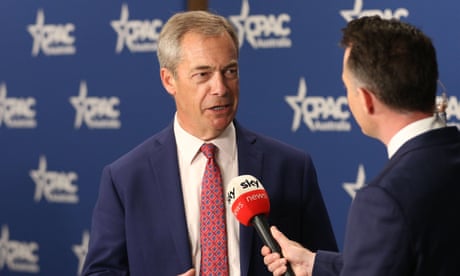- by foxnews
- 23 May 2025
‘Socialism sucks’ stickers on display as CPAC Australia stokes fears of Indigenous voice
‘Socialism sucks’ stickers on display as CPAC Australia stokes fears of Indigenous voice
- by theguardian
- 02 Oct 2022
- in news

Saturday's CPAC conference in Sydney showed Australia's political right is gearing up for a fight against the government's proposed Indigenous voice to parliament - and highlighted the potential political perils of Anthony Albanese keeping many details of the constitutional change out of the public arena for now.
The Conservative Political Action Conference filled a small corner of the International Convention Centre, bringing a mixed assortment of federal senators, rightwing media personalities and international guests together for an audience of around 900. A hodge-podge of topics boiled down to broad grievances around "cancel culture", "shadow banning" and "wokeism"; speakers variously criticised the "conservative cowardice" of Coalition politicians, the mainstream media and talk of "white privilege".
"Get your ID out. Can't have any socialists here today," called one volunteer at the entrance, clad in navy polo tucked into tan chinos. He made the same joke to almost every group walking in, the gag scoring belly laughs each time.
At a conference headlined by former Brexit party leader Nigel Farage and a few members of the Donald Trump administration, some details weren't entirely surprising. A gift bag for attendees included a copy of the Spectator magazine and a discount card to join the Institute of Public Affairs (with a limited edition Margaret Thatcher mug as a sweetener); guests could take a photo with a cardboard cutout of Trump himself; electronic billboards advertised upcoming talks from Jordan Peterson.
Former Liberal senator Eric Abetz wandered through the crowd, flyers for his new role with the Australian Monarchists League ("oppose the Albanese republic") landing on tables alongside material questioning climate change or advertising upcoming One Nation party meetings. Attendees wandered around with "socialism sucks" stickers plastered to their chests.
But between criticism of gender pronouns, whipping up concerns over transgender Australians, and Tony Abbott admitting he didn't understand "gender fluidity", a common theme emerged.
Speaker after speaker - after wheeling out standard complaints about progressive politicians and calling on conservatives to keep fighting - poured scorn on the voice concept.
"Racial separatism," said Coalition senator Jacinta Price; it would "institutionalise discrimination", claimed Tony Abbott; former senator Amanda Stoker called it "terrifying"; former Labor party president and Liberal candidate Warren Mundine called it a "solution looking for a problem". Even international speakers like Farage touched on the topic, presumably after being tipped by conference organisers that it was the issue du jour for Australian conservatives.
Daniel Wild of the Institute of Public Affairs, a conservative thinktank influential in Liberal circles, gave perhaps the strongest indication of where some opponents may try to take the argument.
"Whether it's a yes or no vote, we lose," he said in his speech, claiming if the referendum fails, those voting no would be branded as racists. "The only way we win is by not having the vote to begin with."
Broadly, CPAC speakers called on attendees to fight: to stand up for conservative values, to push back against progressive politicians making changes they don't want or understand, to demand rightwing politicians represent their interests. It was at times combative, speakers declaring those in the room needed to rise and get involved. Farage, Saturday's big-name international guest, wanted fans to become "foot soldiers", to stand at shopping centres or church gates to convince neighbours of their way of thinking.
The coming debate and campaign on the voice referendum may see many of those threads tie together, with the main speakers at this conference likely to be among the loudest critics against the change.
Albanese has committed to a co-design process for the voice with Indigenous groups, with details still to be confirmed. Working groups met this week in Canberra; members later said the voice would provide government advice, but have no veto power. Prof Marcia Langton later told the ABC: "It's going to take some time to explain to people what I think is pretty straightforward."
A Resolve opinion poll this week found 64% of Australians would back the Voice, but also found widespread confusion over what it would actually do. There is in-principle support, but an information gap, around the change.
But mindful of the rare success of referendums in Australia, not wanting to overload voters with detail (or give opponents too much information to poke holes in), the government is not confirming exactly what the voice could look like.
Air rushes to fill a vacuum. But misinformation can rush to fill an information vacuum. Some speakers claimed the voice would have veto power over major government policy, which the working groups said won't be the case. Others claimed it would be a third chamber of parliament, something outright rejected by proponents.
But other more vague claims are filling the space, like allegations the voice would create further discrimination or diminish rights of non-Indigenous people.
Government sources say a big public campaign around the voice is coming, with high-profile sportspeople to start making the case. General TV ads began this week. Albanese confirmed the referendum would happen in the 2023-24 financial year and working groups are beavering away at details. More information and public education will be welcomed.
But opponents of the voice are gearing up for the fight too, and while the government works quietly, its critics are loudly stoking fears that may be hard to eventually extinguish.
- by foxnews
- descember 09, 2016
United Airlines flight returns to Hawaii after concerning message found on bathroom mirror; FBI investigating
United Airlines Flight 1169 to Los Angeles returned to Hawaii after a "potential security concern" aboard the plane. The FBI and police are investigating.
read more


